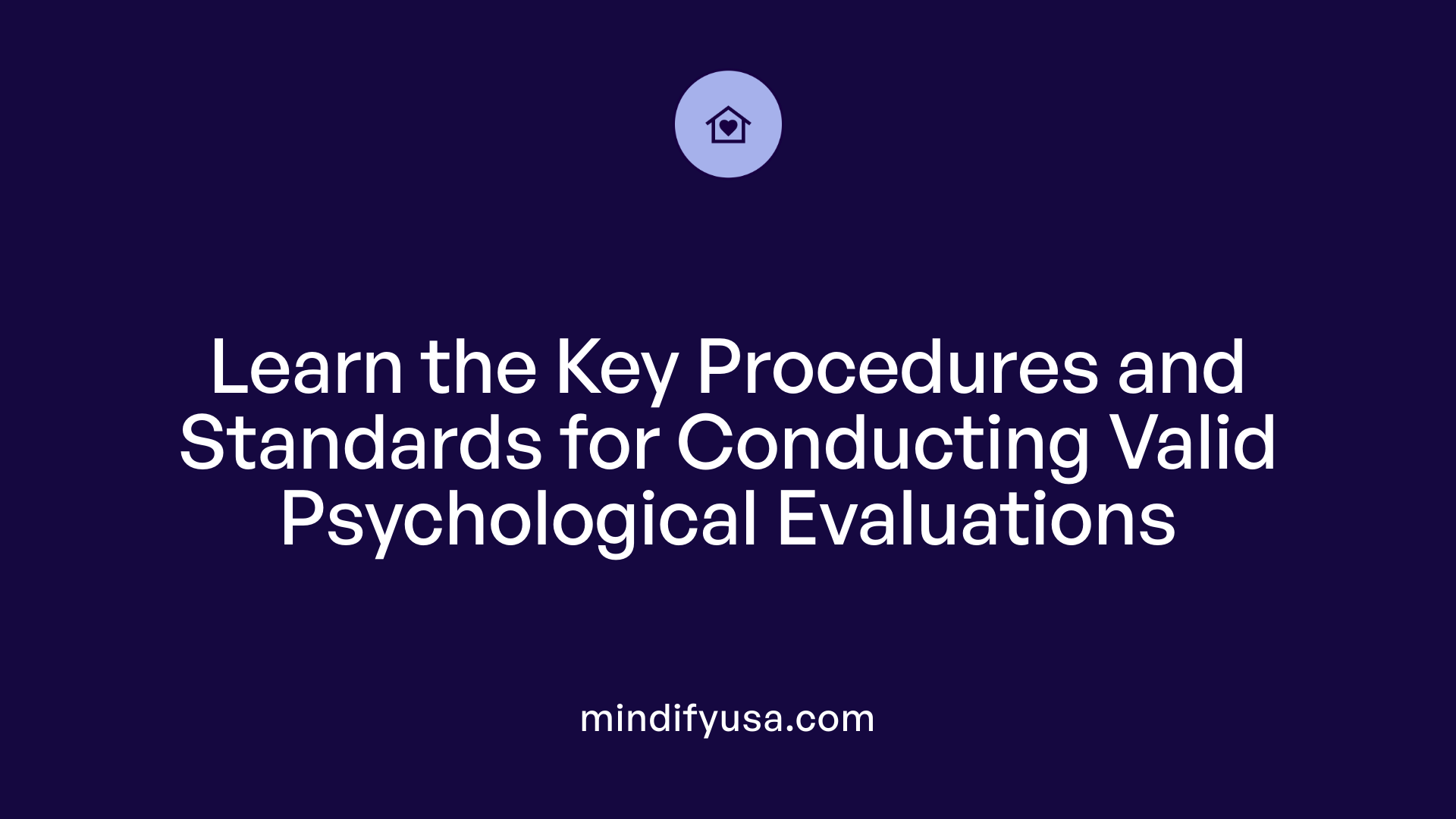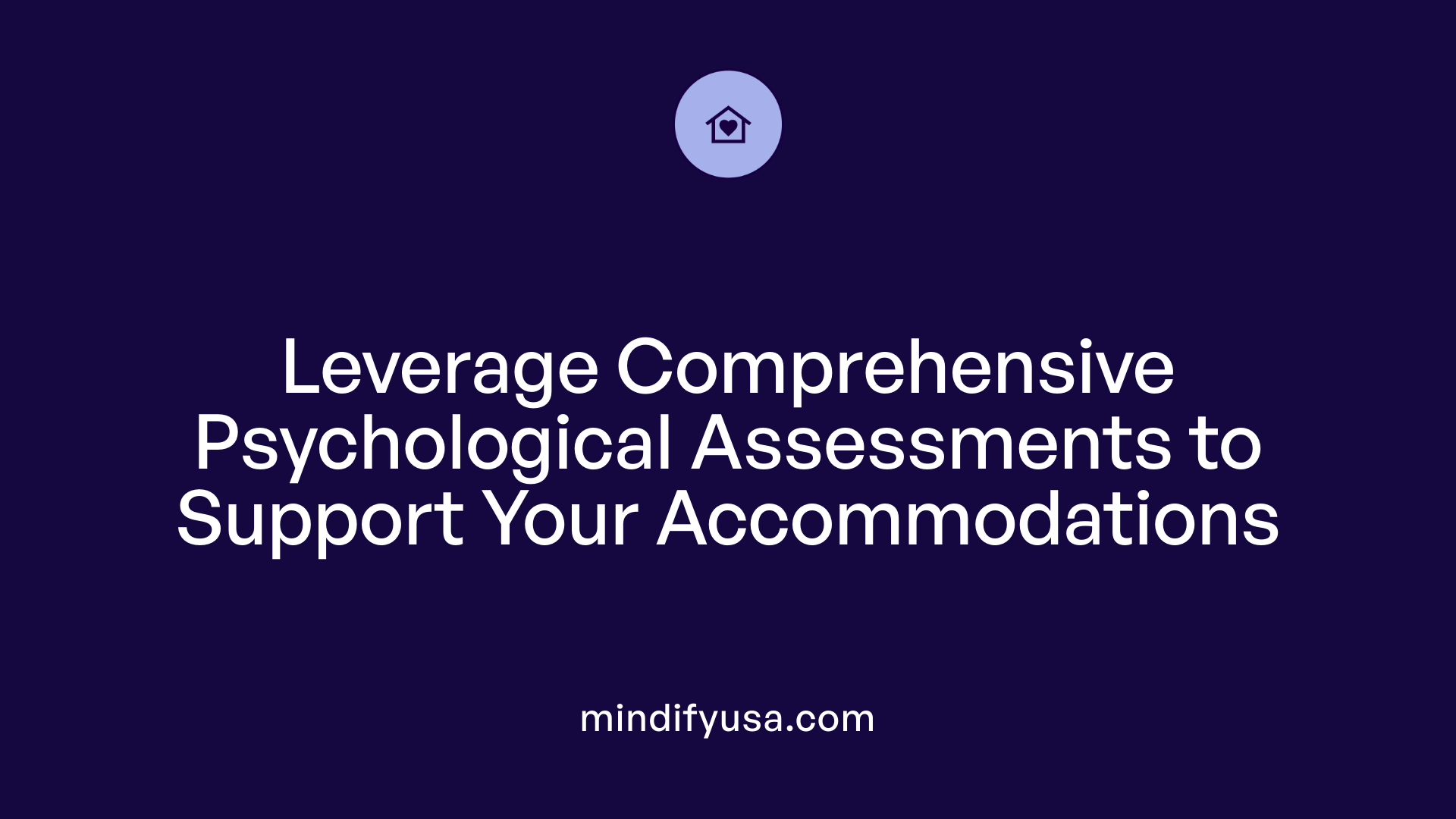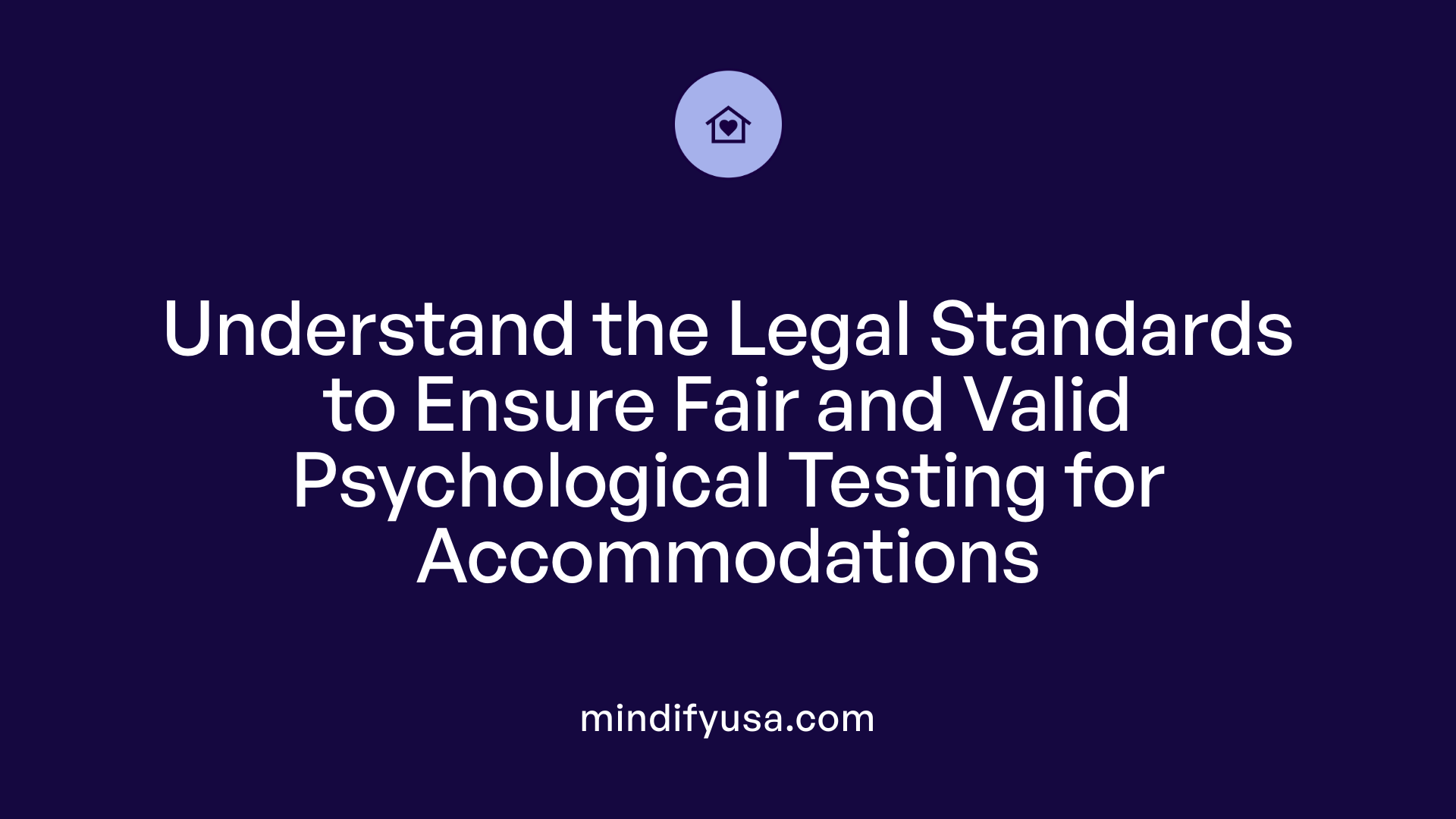The Critical Role of Psychological Testing in Educational Access
Psychological testing plays a fundamental role in supporting students with disabilities seeking academic accommodations. Proper documentation and evaluation are vital not only for securing necessary support but also for ensuring compliance with legal standards such as the ADA and Section 504. This article explores the standards, procedures, and key considerations for psychological assessments that underpin accommodation requests across educational and testing environments.
Standards and Procedures for Conducting Psychological Evaluations

What are the standards and procedures for conducting psychological evaluations for accommodation requests?
Psychological evaluations for accommodation requests must adhere to established professional standards, such as those outlined by the American Psychological Association (APA). These evaluations are performed by qualified, licensed professionals like psychologists, psychiatrists, or clinical social workers.
A comprehensive assessment typically includes a thorough clinical interview, a review of the individual’s medical, educational, and psychological history, and standardized psychological testing. Behavioral observations during testing sessions are also important.
It is essential that the documentation is current, usually within the past 12 months, to accurately reflect the individual’s current functioning. The evaluation should culminate in a DSM diagnosis, detailing the nature of the condition, symptoms, and any relevant treatment or medication history.
Beyond diagnosis, the assessment must describe how the disability impacts major life activities, including academic performance and test-taking, and evaluate functional limitations across different settings. These details support the justification for accommodations.
For each requested accommodation, the report should include a clear rationale directly linked to documented limitations. It should also offer specific recommendations, such as extended time or specialized testing environments.
The evaluation process is individualized, involving collaboration with the person seeking accommodations, and must comply with ethical and legal standards, including those set forth by the ADA. This process ensures that accommodations are tailored, appropriate, and justified based on reliable, valid data from the assessment.
Supporting Requests for Educational or Workplace Accommodations

How can psychological assessments support requests for educational or workplace accommodations?
Psychological assessments play a vital role in substantiating accommodation requests by providing clear, objective evidence of an individual's disabilities and how these impact their functioning. These evaluations are conducted by licensed professionals, such as psychologists or psychiatrists, and typically include standardized tests, clinical interviews, and collateral information. The comprehensive report generated from these assessments details the diagnosis, severity, and the specific ways in which the disability hampers academic or occupational tasks.
These reports establish a direct link between the functional limitations and the need for particular accommodations. For example, if a student has an ADHD diagnosis that affects attention and processing speed, the assessment can justify requesting extended test time or a quiet environment. The documentation should explicitly connect the identified limitations with the accommodations being requested.
It's crucial that assessment reports specify accommodations that do not modify the integrity of the test or task—such as providing enlarged print or assistive technology—ensuring fair and valid evaluation conditions. The detailed findings not only support the legitimacy of the request but also help decision-makers understand the necessity of the accommodations.
By providing a thorough account of the individual's functional capacity and limitations, psychological evaluations facilitate equitable access, promote compliance with disability laws, and enable tailored support strategies. These assessments are indispensable tools that help ensure students and employees receive the assistance they need to perform to their full potential.
| Aspect | Details | Additional Notes |
|---|---|---|
| Objective Evidence | Diagnostics, standardized tests, clinical interviews | Supports lawful and fair accommodation decisions |
| Linking Limitations to Tests | Explicitly states how diagnosed conditions impact functioning | Justifies specific accommodation requests |
| Types of Accommodations | Extended time, environmental adjustments, assistive tech | Must preserve test validity |
| Validity and Fairness | Accommodations do not alter test content | Ensures test scores reflect true ability |
| Importance of Reports | Detailed, personalized, and current | Should include recommendations and functional impact |
Legal and Eligibility Considerations in Psychological Testing

What legal and eligibility considerations are involved in using psychological testing to support accommodation requests?
When requesting accommodations based on a psychological disability, it is essential to follow legal standards outlined by laws such as the Americans with Disabilities Act (ADA). These regulations require that testing conditions be fair and accessible, ensuring that the assessment results accurately reflect the individual's true capabilities.
Psychologists conducting evaluations must ensure their testing methods are valid and unbiased. This means assessments should be appropriate to the individual’s specific disability and should not be influenced by impairments. The results should serve to highlight functional limitations related directly to the disability, supported by current, comprehensive documentation.
Documentation from licensed mental health or medical professionals must clearly identify the diagnosis, describe how the disability impacts major life activities, and explicitly justify the need for any specific accommodations requested. Reports should be recent, typically within the last six months to a year, to ensure current relevance.
Furthermore, providers and testing entities are required to respond promptly to accommodation requests. They must also handle test scores in a manner that does not stigmatize or reveal the individual's disability, maintaining confidentiality.
Evaluations must adhere strictly to professional guidelines and ethical standards, meant to promote equal access and prevent discrimination. When properly documented and ethically administered, psychological testing serves as a fair basis for determining the necessity and appropriateness of accommodations, aligning with legal mandates and supporting the individual's right to equal opportunity in testing environments.
The Role of Letters and Documentation from Qualified Professionals

How should professionals create supportive, objective letters?
When writing a letter to support a person's request for accommodations, it is essential that the document clearly states the diagnosed condition, the functional limitations caused by the disability, and specific recommendations for accommodations. The letter should be based on thorough assessments, such as psychological testing or medical evaluations, and present factual, objective information. It must avoid subjective opinions or assumptions and focus solely on how the disability impacts major life activities, particularly those related to learning or testing situations. The tone should be professional, concise, and respectful of the individual's privacy.
What are the credential requirements for professionals?
Documentation should be authored by qualified healthcare providers with appropriate licensing and credentials in their field. These include licensed psychologists, psychiatrists, licensed clinical social workers, or other licensed medical doctors with expertise in the relevant area. The evaluator’s credentials should be clearly stated, along with their professional license number, licensing authority, and the date of the evaluation or assessment. The professional must be current in their practice to ensure the validity and credibility of the documentation.
What should the content of the documentation include?
A comprehensive professional letter or report must include several key elements:
- The professional’s credentials and licensing information.
- A clear diagnosis, referencing current editions of diagnostic manuals like DSM-5 or ICD-10.
- A detailed explanation of how the condition impacts major life activities, including academic or testing functions.
- A description of the assessments performed, such as psychological tests, medical examinations, or interviews.
- Current treatment details, medication use, and prognosis.
- Specific accommodation recommendations with a rationale linking these to the functional limitations.
- Date of the assessment or letter to establish current relevance.
What are the legal and ethical standards for writing these support letters?
Professionals must adhere to confidentiality, privacy laws, and scope-of-practice regulations. They should provide truthful, unbiased, and objective information, avoiding any statements outside their expertise. The documentation must support the individual's need for accommodations without disclosing unnecessary details about their personal or medical history. Furthermore, professionals should only include opinions that are within their scope of practice and expertise, ensuring the support letter is both legally and ethically valid.
Why is it important to restrict opinions to the scope of practice?
Restricting opinions to areas within a professional’s scope ensures the integrity of the documentation and protects both the professional and the individual requesting support. For example, a psychologist should only comment on psychological or neuropsychological aspects, not medical or physical health issues unless qualified. This focus maintains the objectivity and credibility of the documentation and helps avoid legal issues or misrepresentations. Ultimately, clear scope adherence assists institutions and decision-makers in making informed, fair decisions based on accurate information.
Documentation Standards and Key Components of Accommodation Letters

What are the key considerations and documentation standards for writing accommodation letters based on psychological testing?
When requesting accommodations based on psychological testing, it is essential that the supporting documentation meets strict standards of quality and clarity. The evaluation must be conducted by qualified professionals, such as licensed psychologists, psychiatrists, or clinical social workers, who have credentials appropriate to the diagnosis.
A comprehensive and recent assessment is critical. Typically, evaluations should be conducted within the last five years to accurately reflect the current functioning of the student. The documentation should include specific diagnostic information based on the DSM-5 or current edition, with a clear explanation of how the disorder impacts major life activities, especially learning, memory, attention, and emotional regulation.
The evaluation report must detail the assessment methods used, such as standardized tests (e.g., WAIS, WIAT III), clinical interviews, behavioral observations, and medical or psychological history. Objective scores and interpretative summaries should be included to substantiate the diagnosis.
Furthermore, the documentation should explicitly justify the requested accommodations, linking them directly to the functional limitations identified. This can include descriptions of how symptoms such as difficulty concentrating or processing speed affect test performance or coursework.
Professional credentials of the evaluator and the assessment’s methodology must be transparently included. These details help verify that the diagnosis and recommendations are valid and reliable. The documentation should also demonstrate that other causes have been ruled out and that the disability is substantial enough to warrant accommodations.
Following standards from reputable entities like the American Psychological Association (APA) and ETS ensures that the documentation adheres to legal and ethical norms. Properly prepared documentation enhances the likelihood that accommodations will be granted fairly and without delay, supporting the student's academic success.
| Aspect | Requirement | Purpose |
|---|---|---|
| Recentness | Usually within 5 years | Ensures current functional status |
| Professional credentials | Licensed psychologist, psychiatrist | Validates diagnosis |
| Diagnostic details | DSM-5 criteria, severity, symptoms | Clarifies the disability |
| Assessment tools | Standardized tests, interviews, observations | Objective evidence |
| Link to accommodations | Justification tied to functional impact | Supports requested adjustments |
| Documentation clarity | Detailed reports with scores and summaries | Facilitates review |
| Ethical adherence | Following APA, ETS standards | Ensures compliance |
Facilitating Access Through Well-Structured Psychological Evaluations
Comprehensive psychological testing, conducted by qualified professionals, is indispensable for substantiating the need for academic and testing accommodations. These assessments must adhere to strict standards of validity, relevance, and timeliness to ensure that documentation accurately reflects the individual's functional limitations. Clear, objective, and legally compliant reports serve as powerful tools to support equitable access, promote compliance with disability laws, and facilitate meaningful support for students and individuals in testing environments. As institutions and testing entities continue to prioritize fairness, the role of expertly conducted psychological evaluations remains central to the process of securing necessary accommodations.
References
- “Here's My Accommodation Letter”: Discussing Academic ...
- Accommodation Request - Nevada Board of Psychological Examiners
- ADA Requirements: Testing Accommodations
- Documentation Guidelines: Psychiatric Disorders – Accommodations
- What Does a Neuropsychological Evaluation for Test ...
- So, You Want Testing Accommodations? - Brown Goldstein Levy
- Sample Medical Documentation for Workplace Accommodations
- Documentation Guidelines and Accommodations
- Getting Accommodations for Standardized Tests






































































































